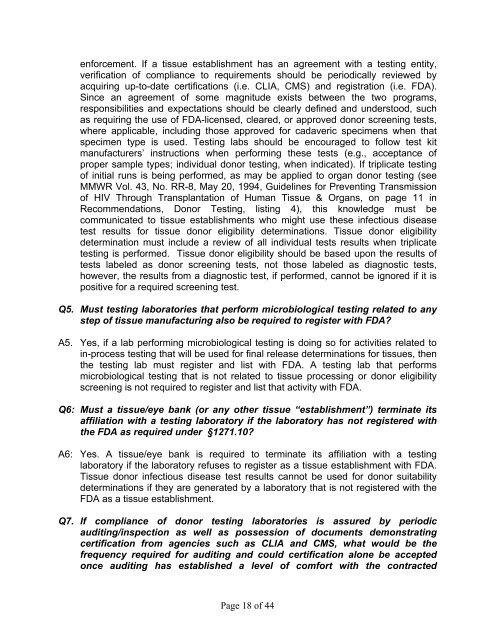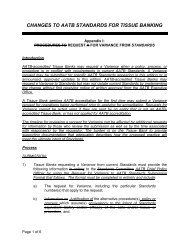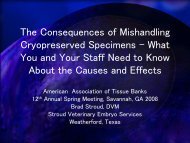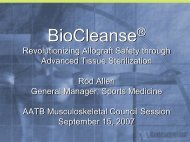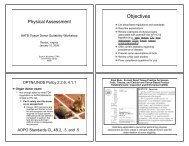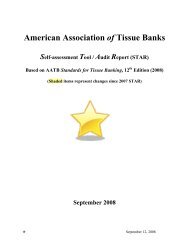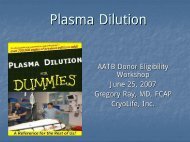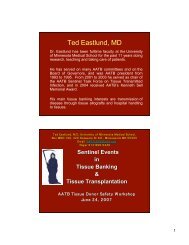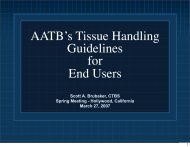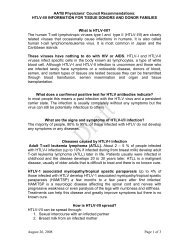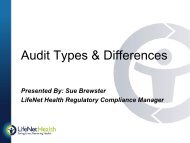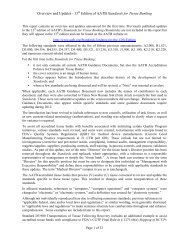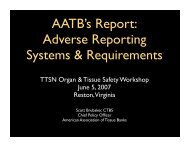Guidance Document - American Association of Tissue Banks
Guidance Document - American Association of Tissue Banks
Guidance Document - American Association of Tissue Banks
- No tags were found...
Create successful ePaper yourself
Turn your PDF publications into a flip-book with our unique Google optimized e-Paper software.
enforcement. If a tissue establishment has an agreement with a testing entity,verification <strong>of</strong> compliance to requirements should be periodically reviewed byacquiring up-to-date certifications (i.e. CLIA, CMS) and registration (i.e. FDA).Since an agreement <strong>of</strong> some magnitude exists between the two programs,responsibilities and expectations should be clearly defined and understood, suchas requiring the use <strong>of</strong> FDA-licensed, cleared, or approved donor screening tests,where applicable, including those approved for cadaveric specimens when thatspecimen type is used. Testing labs should be encouraged to follow test kitmanufacturers’ instructions when performing these tests (e.g., acceptance <strong>of</strong>proper sample types; individual donor testing, when indicated). If triplicate testing<strong>of</strong> initial runs is being performed, as may be applied to organ donor testing (seeMMWR Vol. 43, No. RR-8, May 20, 1994, Guidelines for Preventing Transmission<strong>of</strong> HIV Through Transplantation <strong>of</strong> Human <strong>Tissue</strong> & Organs, on page 11 inRecommendations, Donor Testing, listing 4), this knowledge must becommunicated to tissue establishments who might use these infectious diseasetest results for tissue donor eligibility determinations. <strong>Tissue</strong> donor eligibilitydetermination must include a review <strong>of</strong> all individual tests results when triplicatetesting is performed. <strong>Tissue</strong> donor eligibility should be based upon the results <strong>of</strong>tests labeled as donor screening tests, not those labeled as diagnostic tests,however, the results from a diagnostic test, if performed, cannot be ignored if it ispositive for a required screening test.Q5. Must testing laboratories that perform microbiological testing related to anystep <strong>of</strong> tissue manufacturing also be required to register with FDA?A5. Yes, if a lab performing microbiological testing is doing so for activities related toin-process testing that will be used for final release determinations for tissues, thenthe testing lab must register and list with FDA. A testing lab that performsmicrobiological testing that is not related to tissue processing or donor eligibilityscreening is not required to register and list that activity with FDA.Q6: Must a tissue/eye bank (or any other tissue “establishment”) terminate itsaffiliation with a testing laboratory if the laboratory has not registered withthe FDA as required under §1271.10?A6: Yes. A tissue/eye bank is required to terminate its affiliation with a testinglaboratory if the laboratory refuses to register as a tissue establishment with FDA.<strong>Tissue</strong> donor infectious disease test results cannot be used for donor suitabilitydeterminations if they are generated by a laboratory that is not registered with theFDA as a tissue establishment.Q7. If compliance <strong>of</strong> donor testing laboratories is assured by periodicauditing/inspection as well as possession <strong>of</strong> documents demonstratingcertification from agencies such as CLIA and CMS, what would be thefrequency required for auditing and could certification alone be acceptedonce auditing has established a level <strong>of</strong> comfort with the contractedPage 18 <strong>of</strong> 44


